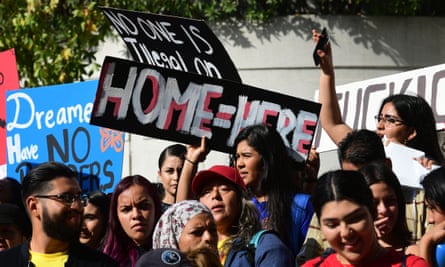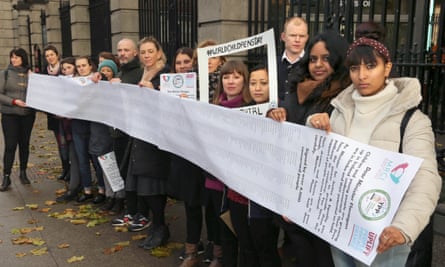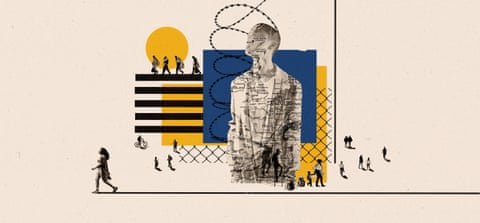‘Why do you sound so British?” the immigration officer asked 15-year-old Ijeoma Moore as she followed orders to pack for herself and her 10-year-old brother. Officers had arrived at their London home that morning in 2010, as they were eating breakfast and getting ready to leave for school. “Because I am British,” the teenager replied.
What else could she be? She had lived in the UK since she was two years old. She loved tea and toast and “stupid telly”. But her mother’s repeated residency applications to the Home Office had all been rejected. Moore was not a British citizen.
Still in school uniform, the children and their visiting father – her mother was not there that day – were put in the Home Office van. Moore felt like she was watching someone else’s life on TV. They were taken to an immigration detention centre, where she narrowly avoided deportation three times. Eventually she and her brother were placed in foster care and her father sent to Nigeria. “I had to grow up really quick and become like a mum to my brother,” Moore says.

A decade on, Moore is still not a UK citizen. She will not officially become British until she turns 33 – 31 years after she arrived in the country and picked up a London accent. And it is not guaranteed if she runs out of money to pay the soaring fees, or the Home Office loses a document from the required stack of evidence, or if the rules change yet again.
Q&AWho are Europe's dreamers?
Show
Dreamers is the US term collectively given to young people without legal immigration status who were brought to the US as children. Some young people living in Europe without legal status now also call themselves 'dreamers' because their struggle against hostile European migration and asylum policies echoes the US campaign. Between 3.9 and 4.8 million people in Europe are believed to be living without residency permits, about 65% of whom are under 35 years old, according to the Pew Research Center. In the UK, a recent University of Wolverhampton study commissioned by the mayor of London estimated there are 332,000 children and young people living undocumented in the UK, including 106,000 children born in the country. Estimating numbers of undocumented people necessarily involves guesswork – and the methodologies are often criticised – but it is thought there are millions of dreamers across Europe.
Europe’s dreamers
In the US, they are known as the Dreamers, undocumented or “alien” minors who as a group have for two decades campaigned for legal status under the Development, Relief and Education for Alien Minors (Dream) Act. Their struggle, associated in the public mind with the American dream, has won broad public and bipartisan political support. It prompted the intervention of Barack Obama, who in 2012 created the Deferred Action for Childhood Arrivals (Daca) programme to allow people brought illegally to the US as children to stay and work. This protection is still under threat from Donald Trump’s administration despite a recent US supreme court ruling in the Dreamers’ favour. As Obama said in 2012: “They are American in their heart, in their minds, in every single way but one: on paper.”
Europe has its own dreamer generation, but unlike the US Dreamers, their stories are largely unknown. It is only when someone like the Glasgow-born singer Bumi Thomas is ordered to leave the UK that the immigration rules stopping people from staying in the countries they were born or grew up in stir public outrage. Millions of young people across Europe have, like Thomas, been born on the wrong side of little-known laws – in her case a 1981 restriction on automatic citizenship at birth. They grew up feeling British or French or Italian or European, but are now trapped in a state of limbo. The threat of deportation hangs over them because, like the US Dreamers, they lack the right piece of paper.

The US Dreamers have evolved into an influential campaign movement, and have changed how most Americans see undocumented people: as families, as strivers, as patriots. In Europe, populist politicians and rightwing press still fuel the perception that the undocumented population is a faceless mass of opportunists. It is not well understood that the majority of people without papers are young people, many of whom arrived in Europe as small children, and some were even born here.
Europe forces its dreamers to live in the shadows. Many live in permanent fear of detention or deportation. On their 18th birthday they are barred from working or going to university, from travelling or voting. Some live from one temporary permit to the next, in fear of losing them. Others have scant prospect of ever being allowed to stay legally. In some countries, these restrictions worsened following the political backlash to the 2015 spike in migration across the Mediterranean.
But now, tired of being invisible, some of Europe’s dreamers are risking everything to speak out about their immigration status and build a movement that echoes the US’s Dreamers in calling for a future for themselves in Europe.
Over the coming days the Guardian will profile five European dreamers and investigate the policies that trap millions of young people in an undocumented limbo.

Inspired by the US
Under blinding spotlights, Ijeoma Moore’s heart was pounding as she stood in front of thousands at a hustings for the 2016 London mayoral election and told the story of her detention and struggle to win legal status. “Ijeoma, you are a Londoner,” Sadiq Khan, the eventual victor, told her.
In the years since she was taken into detention, Moore’s life had been put on hold. Although she secured limited leave to remain in the UK in 2015, she could not go to university.
A tightening of immigration rules – the UK’s “hostile environment” – refused most people like Moore student loans and asked them to pay the same university fees as foreign students. Waiting periods to apply for citizenship went up to 10 or even 20 years. The associated costs, including the immigration NHS surcharge introduced in 2015, almost tripled, while legal aid to help families navigate the new rules was slashed.
But the hostile environment – rebranded as the “compliant environment” – undermined its own stated goal: reducing the undocumented population. “They not only made it harder to live here if you’re illegal, they made it much harder to go from being illegal to legal,” says Anita Hurrell, the head of the Coram Children’s Legal Centre’s migrant rights project. “Even if you’ve got a strong claim to stay, you can’t get to the next stage. It seems to increase illegality.”
Moore’s first trip abroad was to Houston, Texas, where hundreds of undocumented young activists had gathered for a meeting of the largest network of dreamers in the US, United We Dream.
Inspired by the Dreamers, the young UK activists recently launched a new organisation, We Belong, that campaigns for shorter and more affordable routes to citizenship for people who have grown up in Britain.
Moore finally began university last year. She wants to be a child psychologist.
During the coronavirus pandemic, she phoned her mother, a key worker, daily. “Have you touched anything?” Moore asked her. “Have you eaten?”
Born in Europe
Europe’s undocumented children are not all migrants; many are children born in Europe to migrant parents. Like Giannis Antetokounmpo, the almost 7ft-tall international basketball star affectionately known as the “Greek freak”. He was among tens of thousands of children born in Greece and effectively excluded from citizenship because of their parents, until changes in 2015. It took nine years of advocacy by Generation 2.0, a movement led by second-generation immigrants. But Greek-born children are still falling through gaps in the law, or face years waiting for papers.

In Italy, similar efforts have been repeatedly blocked amid a fierce rightwing backlash. “When we started speaking out, MPs and political leaders looked at us as if we were martians,” says Paula Baudet Vivanco, the spokesperson of Italiani Senza Cittadinanza (Italians Without Citizenship). Vivanco arrived in Italy aged seven in the early 1980s, after her Chilean dissident parents escaped the Pinochet regime. Vivanco did not obtain Italian citizenship until she was 33. “They didn’t know we existed: that there were adults who had grown up in Italy, lived through all these situations, and were claiming their rights,” she said. “But Italy is our country.”
Finding family
Europe’s dreamers also include children who travelled alone or were trafficked. Like Shiro (not her real name), who was trafficked into domestic slavery from Ethiopia to the Gulf and then the UK and was, she says, abused by every family she worked for along the way. The UK passed anti-slavery legislation in 2015 but it does not protect trafficking survivors from deportation.
For three years, Shiro could not convince the Home Office she was a child – the age on her passport had been forged to facilitate her trafficking. It was a dark period of her life. She lived with “scary” people, could not register for English classes and was terrified of being returned to Ethiopia. Now she has joined a group of trafficking survivors who campaign with the charity Ecpat UK (Every Child Protected Against Trafficking) for a path to immigration status. “We all have no family, but we can share our stories with each other,” she says. “We have to stand up for each other, we don’t have any other option.”
The regularisation taboo
In Ireland, Young, Paperless and Powerful, a campaign of undocumented youth, has won overwhelming public sympathy and support from across the political spectrum. In November 2019, the campaign group was visited in Dublin by the United We Dream co-founder Cristina Jiménez. In the same month, the then taoiseach, Leo Varadkar, compared the undocumented young people living in Ireland to American Dreamers, some of whom are the children of Irish people who travelled to the US without visas. “They grew up here, they speak with Dublin, Cork or Donegal accents. They are not going to be deported,” he told the Irish parliament. The new Irish coalition formed in June has pledged to “create new pathways” to residency for long-term undocumented people, which is progress, campaigners say. But Dublin remains bound by its EU obligations and that means Ireland won’t offer amnesty to the undocumented. As Varadkar said: “It has been agreed at EU level that there will not be amnesties.”
For over a decade, amnesty has been a dirty word among EU policymakers in Brussels. In the 10 years leading up to 2008, as many as 6 million undocumented migrants were granted a legal right to remain in European countries through measures to “regularise” their status, before a backlash by European politicians arguing that they would attract more migrants made regularisation a political taboo in the EU. Some European countries have quietly proceeded regardless. In Spain – which launched Europe’s last large-scale regularisation in 2005 – grassroots groups have mounted a new campaign in the wake of the coronavirus pandemic.
The crisis is teaching us that “you can’t afford to neglect people who are vulnerable: if you don’t treat the whole population, then the whole population will suffer”, said Michele LeVoy, the director of the Platform for International Cooperation on Undocumented Migrants. “This pandemic has given more visibility to those who are really the most vulnerable in society.”
European advocates insist undocumented children should have a route to legal status that is independent of their parents, without exorbitant fees, minimum income thresholds, or bureaucratic hurdles. It should be based on the child’s “best interests” and time spent in the country during the formative years of their life. “Just three years is already a long time in the life of a child,” says LeVoy.
Deporting the dreamers
In summer 2017, hundreds of young Afghans camped out in one of Stockholm’s main squares for almost two months in protest at the deportation of children to Afghanistan. They called themselves Ung I Sverige (Young in Sweden). “We want to build a life here and make this country stronger,” their mission statement reads.
That summer, Nabi Eskanderi swam as often as he could. The 17-year-old grew up in an arid region of land-locked Afghanistan. Finding himself surrounded by water on the Swedish island of Öland, he took swimming lessons. Eskanderi came to Sweden by land and sea in 2015. He had fled for his life from Afghanistan after accidentally damaging a Qur’an. After his asylum application was rejected, swimming helped him sleep at night.
One day at the pool, he asked a girl if she wanted to join a game of water volleyball. They became friends, and things slowly grew serious. Eskanderi met Jennifer’s parents, then grandparents. He went to stay with them for Christmas and was thrilled to be included in family meals and gift-giving.

The Ung I Sverige protests did not stop deportations to Afghanistan. Eskanderi was at his girlfriend’s house when the police arrived. They reassured her he would be released soon. But after a few weeks in detention, he was put on a flight to Afghanistan. This was not a homecoming. It was the first time he had ever been to Kabul.
He went into virtual hiding, in a shared house supported by Swedish activists. It is still too dangerous to return to his family; even in Kabul he fears suspicion and hostility towards people returning from Europe. He misses the Swedish landscape, European bathrooms and liberal attitudes to religion, but most of all, Jennifer.
He gets upset when Jennifer tells him how much she misses him. They talk about whether she could help him get a visa to return, but Eskanderi doubts Swedish immigration authorities would allow that. If nothing else works, he wonders how to make enough money to pay a smuggler.
“I changed a lot in Sweden, I felt I belonged to that society,” he says. “Even though many people wanted me to stay in Sweden – they even called me part of their family – there was nothing I could do, and no one could help me.”
Giacomo Zandonini contributed to this reporting. The series is a collaboration with the migration newsroom at Lighthouse Reports
